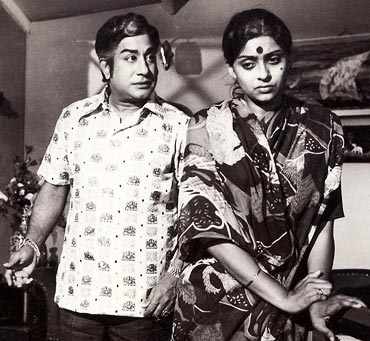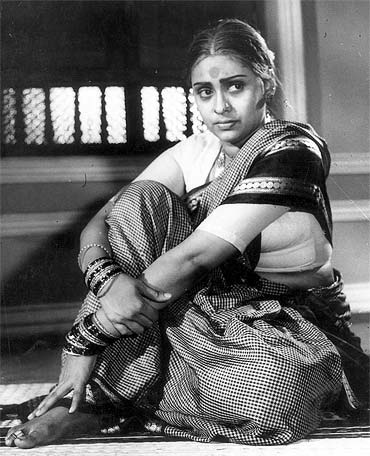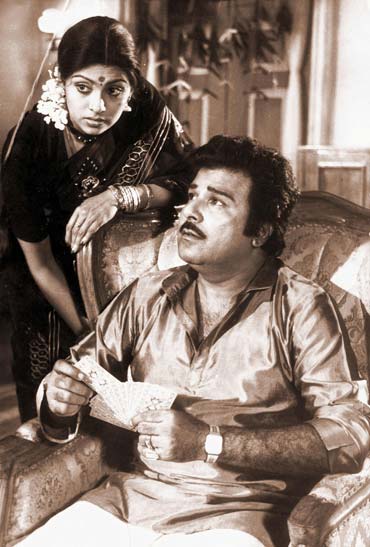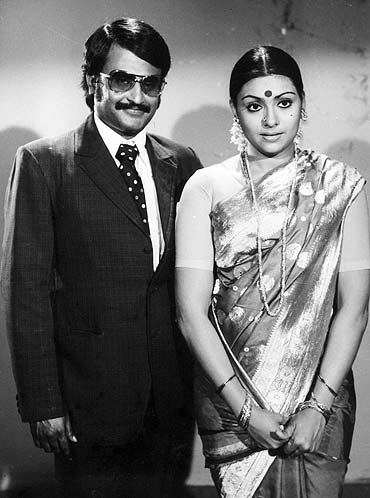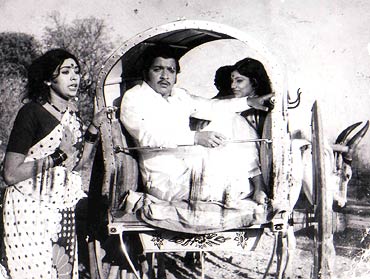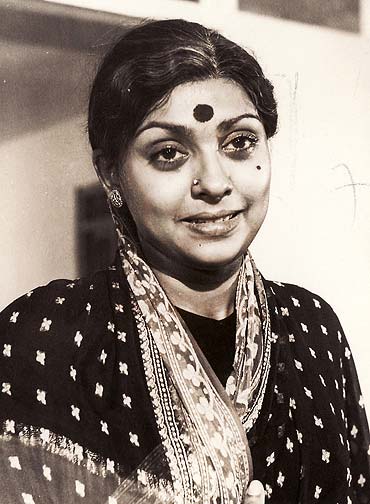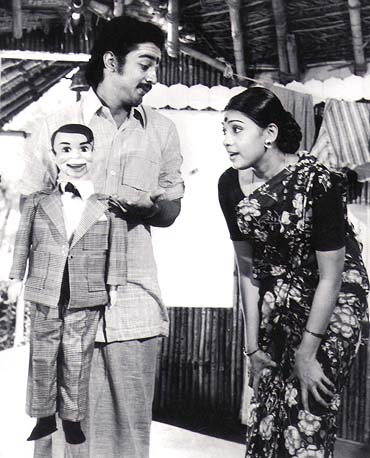 | « Back to article | Print this article |
Remembering Tamil actress Sujatha
For an industry that is all about glitz and glamour quotient, it's no surprise that Tamil cinema thrives on larger-than-life action stories, with its women mostly lurking in the background, serving mostly as embellishments.
And yet, this facade occasionally gives way to directors who seek out strong actresses; those who can take up a challenging role and give a new dimension to the film, and make it more about their character.
Sujatha, the accomplished actress who passed away after a long illness yesterday, was one of them.
Remembering Tamil actress Sujatha
The industry came to a standstill when news of her unexpected death reached them. The 58 year old actress had died of heart failure, after having suffered a heart ailment.
The acclaimed actress was born on December 10, 1952, and blossomed into one of South India's more popular character artists, acting in Tamil, Telugu, Malayalam, Kannada and even Hindi films.
Remembering Tamil actress Sujatha
Growing up in Sri Lanka and later shifting to Kerala, she did a Malayalam film Ernakulam Junction and that paved the way for future success.
Not even she would have had any idea about how her future would be shaped. With a penchant for acting ever since childhood, she grabbed the attention of K Balachander, the man who destroyed Tamil cinema's cliches and was soon the heroine of his Aval Oru Thodarkadhai (She's a Never Ending Story, 1974).
And as the audience was first introduced to her character, Kavitha, in the movie cleaving though crowds in a sleeveless jacket, dealing with her co-workers in an office, they sat up in pleasant surprise. But it was when they saw her enter her home and assume the mantle of bread-winner, rattling her mother, siblings, ruthlessly questioning her drunken brother and generally running her home, did they watch her in awe.
Remembering Tamil actress Sujatha
The movie dealt with the sensitive issue of a young girl becoming the head of the family. Kavitha also had a boyfriend, a taboo subject those days, who, tired of waiting for family to regroup itself, eventually proposes to Kavitha's sister.
This was a movie that hinged almost entirely on the strong female lead; it was all about her motives, character, the decisions she made. And Sujatha managed to bring across a strength that still showed slivers of vulnerability; an iron-clad armour with chinks in it that showed how she longed for her family's love and understanding. Something she never received.
Remembering Tamil actress Sujatha
With accolades pouring in for her pathbreaking portrayals, Sujatha embarked on a series of movies that would made any actress worth her salt green with envy. Annakkili followed in 1976, and then came along another K Balachander classic, Avargal (1977).
This time, she was Anu, a young mother struggling to come to terms with a sadistic ex-husband, a former lover who had never responded to her pleas, and a new one, waiting to claim her heart. Once again, Sujatha's realistic portrayal, sans theatrics won her laurels.
Remembering Tamil actress Sujatha
Yet another classic was Noolveli (1978), where she played a writer and Censor Board member with elan.
She would follow these movies with a long stint in Telugu, Kannada and Hindi, with movies such as Guppedu Manasu, Gorintaku (both 1979), Prema Tarangalu (1980), Ek Hi Bhool (1981), and a host of others.
Remembering Tamil actress Sujatha
With a long lineage of actors, she had unique opportunities to share screen space with legends such as Sivaji Ganesan, stars such as Rajnikanth Kamal Haasan among others.
Even as glamour threatened the art of serious acting, she would come into her own, with strong women-centric roles in movies such as Vidhi (1984), where she played a lawyer who battles to bring justice to her raped client.
Eventually, though, she gradually morphed into that staple of Tamil cinema well before her time: donning 'mother' roles. By stages, she wore white saris and mouth platitudes as she played mother to men she had starred with: Rajnikanth in Uzhaippali and Baba for example.
She went on to do similar roles in movies like Aval Varuvala, Arul and Attagasam. Her last memorable role would be that of Ajith's mother-in-law in the hit, Varalaaru (2004).
Remembering Tamil actress Sujatha
Through it all, she still managed to invest the roles with something of her trademark: strength of character, individuality and an attitude that suggested that she wouldn't give way, to anything. Despite all this, Tamil cinema never really utilized her talents, the way it had in the first few years of her career.
And though she spent the last few years of her career playing mother roles, Tamil cinema aficionados will perhaps choose to remember her best as the actress who brought Kavitha to life, making fiery, spirited young women a force to reckon with.
